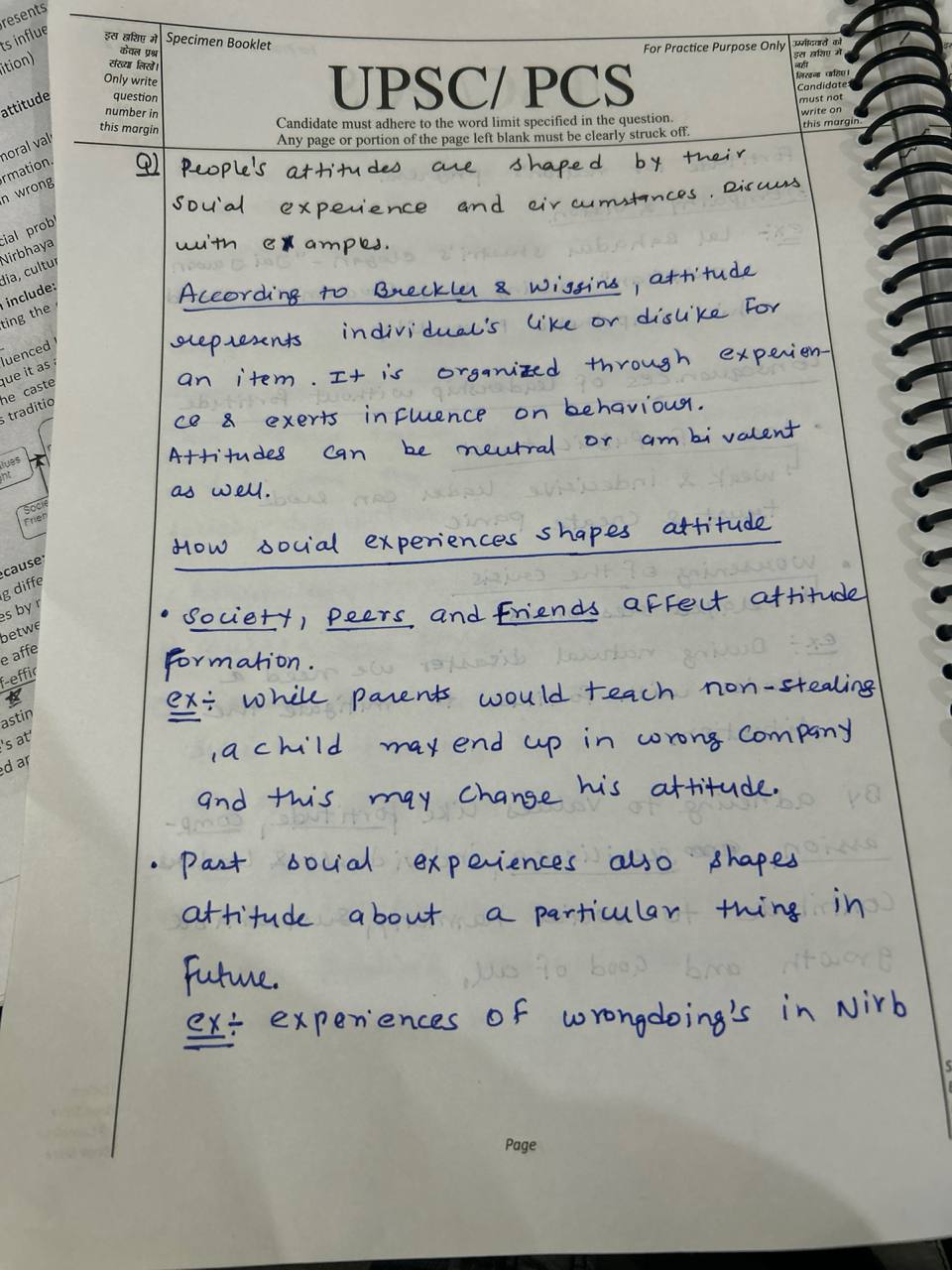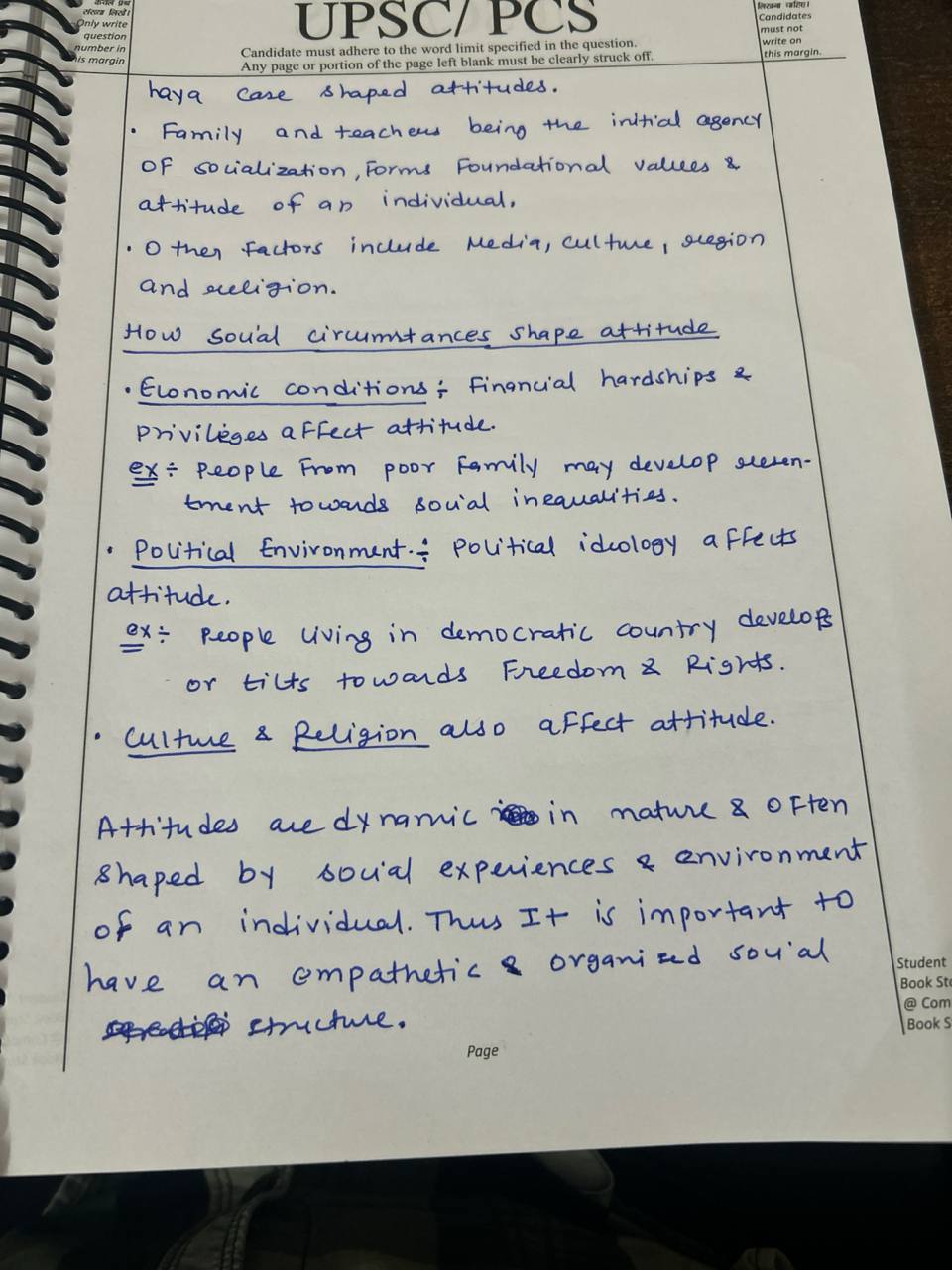The family and the social environment in which we are raised typically have an unconscious influence on our attitudes toward life, work, other people, and society. Many of these unintentionally picked attitudes and ideals are undesirable in members of today’s ...
- Recent Questions
- Most Answered
- Answers
- No Answers
- Most Visited
- Most Voted
- Random
- Bump Question
- New Questions
- Sticky Questions
- Polls
- Followed Questions
- Favorite Questions
- Recent Questions With Time
- Most Answered With Time
- Answers With Time
- No Answers With Time
- Most Visited With Time
- Most Voted With Time
- Random With Time
- Bump Question With Time
- New Questions With Time
- Sticky Questions With Time
- Polls With Time
- Followed Questions With Time
- Favorite Questions With Time
Mains Answer Writing Latest Questions
People’s circumstances and social experiences influence their attitudes. Talk about it with examples.
Roadmap for Answer Writing 1. Introduction Briefly introduce the topic of social problems and the importance of understanding attitudes towards them. State that contrasting attitudes about social problems, particularly the caste system, are prevalent in society. 2. Factors Affecting the Formation of Attitudes A. Personal ...
-
Best Answer
Model Answer Introduction A person's attitude towards social problems is shaped by various factors, including personal experiences, cultural and societal norms, education, and media exposure. These elements contribute to contrasting perspectives on issues like the caste system in Indian society. FacRead more
Model Answer
Introduction
A person’s attitude towards social problems is shaped by various factors, including personal experiences, cultural and societal norms, education, and media exposure. These elements contribute to contrasting perspectives on issues like the caste system in Indian society.
Factors Affecting Attitudes
Personal Experiences
Individual encounters with social issues, such as poverty or discrimination, can significantly influence attitudes. For example, someone who has faced caste-based discrimination may develop a strong opposition to the caste system.
Cultural and Societal Norms
Cultural beliefs and societal norms, such as traditional views on gender roles and social hierarchy, play a crucial role in shaping attitudes. These norms can reinforce existing biases or promote progressive views.
Education and Media Exposure
Education systems and media representation provide information and diverse perspectives that can alter perceptions about social issues. Access to education often fosters critical thinking, enabling individuals to question traditional beliefs.
Contrasting Attitudes Towards the Caste System
Traditionalist Attitude
Emphasis: Upholding caste hierarchy.
Explanation: Some individuals believe the caste system is integral to Indian culture. They view caste as a necessary social structure that promotes stability.
Example: Organizations like the Karni Sena oppose inter-caste marriages, advocating for the preservation of caste-based divisions.Progressive Attitude
Emphasis: Promoting caste equality and social justice.
Explanation: Many recognize the caste system as a discriminatory structure that perpetuates inequality. They aim to dismantle it and promote equal opportunities.
Example: Bezwada Wilson, a Dalit rights activist, co-founded the Safai Karmachari Andolan to combat caste-based discrimination and manual scavenging.Mixed Attitude
Emphasis: Acknowledging caste while advocating for reform.
Explanation: Some accept the caste system’s historical significance but call for reforms rather than complete abolition. They support policies that foster inclusivity.
Example: Nobel laureate Amartya Sen promotes addressing social inequality through reforms while recognizing the caste system’s complexity.Conclusion
In summary, attitudes toward social problems are influenced by a combination of personal experiences, cultural norms, and education. The contrasting attitudes towards the caste system in India reflect these influences, highlighting the need for education and awareness to foster a more equitable society.
See less



Influence of Family and Social Surroundings on Attitudes 1. Unconscious Shaping of Attitudes: Explanation: Our foundational attitudes towards life, work, and society are largely formed by our early experiences within the family and broader social environment. These attitudes are often internalized wRead more
Influence of Family and Social Surroundings on Attitudes
1. Unconscious Shaping of Attitudes:
2. Undesirable Attitudes in Modern Democratic Society:
3. Impact on Professional and Social Interactions:
4. Recent Efforts to Address Unconscious Bias:
5. Educational and Social Reforms:
Conclusion: Unconscious attitudes shaped by family and social surroundings can sometimes conflict with the values of a modern democratic and egalitarian society. Addressing these through education, awareness programs, and social reforms is crucial for fostering a more equitable and inclusive society.
See less